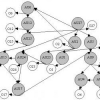Free Online Productivity Tools
i2Speak
i2Symbol
i2OCR
iTex2Img
iWeb2Print
iWeb2Shot
i2Type
iPdf2Split
iPdf2Merge
i2Bopomofo
i2Arabic
i2Style
i2Image
i2PDF
iLatex2Rtf
Sci2ools
106
click to vote
ICPR
2008
IEEE
2008
IEEE
Exploiting qualitative domain knowledge for learning Bayesian network parameters with incomplete data
When a large amount of data are missing, or when multiple hidden nodes exist, learning parameters in Bayesian networks (BNs) becomes extremely difficult. This paper presents a learning algorithm to incorporate qualitative domain knowledge to regularize the otherwise ill-posed problem, limit the search space, and avoid local optima. Specifically, the problem is formulated as a constrained optimization problem, where an objective function is defined as a combination of the likelihood function and penalty functions constructed from the qualitative domain knowledge. Then, a gradient-descent procedure is systematically integrated with the E-step and M-step of the EM algorithm, to estimate the parameters iteratively until it converges. The experiments show our algorithm improves the accuracy of the learned BN parameters significantly over the conventional EM algorithm.
Computer Vision | Constrained Optimization Problem | Conventional Em Algorithm | ICPR 2008 | Qualitative Domain Knowledge |
Related Content
| Added | 05 Nov 2009 |
| Updated | 06 Nov 2009 |
| Type | Conference |
| Year | 2008 |
| Where | ICPR |
| Authors | Qiang Ji, Wenhui Liao |
Comments (0)

